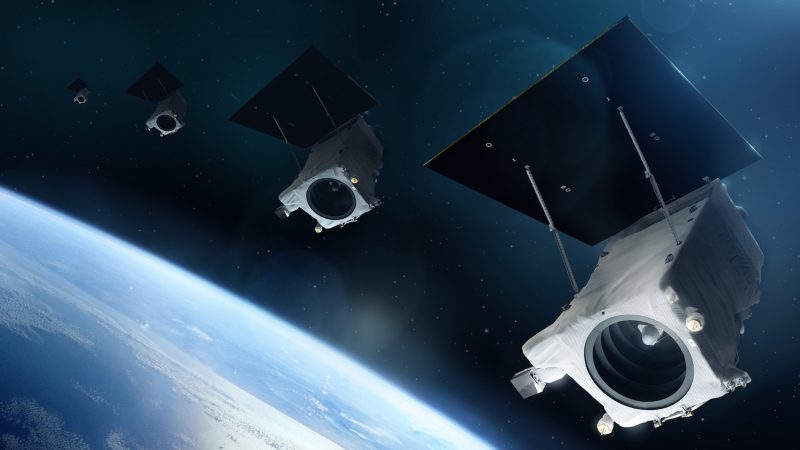Maxar Pushes Legion Launch to 2022 After Program Delays

A rendering of Maxar’s WorldView Legion constellation. Photo: Maxar Technologies
Maxar Technologies is pushing back the launch of the first satellite in its WorldView Legion constellation to mid-March 2022. This is an additional delay after last quarter, the launch slipped to the fourth quarter of this year.
CEO Dan Jablonsky provided an update in the program during the company’s second quarter 2021 investor call. Previously, Raytheon found an issue during testing on a high-precision optical instrument due to workmanship, and due to fixes on this, the hardware delivery is coming later than expected. Jablonsky said the COVID-19 pandemic continues to cause delays for integration, testing, and software teams.
“I’m not pleased with the additional Legion delays. That said, the methodical work we’re doing on the program are the right steps,” Jablonsky said. “We’re building a generational constellation that is going to drive growth, profits, and cash flows for the next ten years and we want to be confident that we’ve got it right.”
He said Maxar has assembled a mission assurance and an independent review called a red team to assess the program and remaining work streams, and also added additional internal and external software engineering resources.
Maxar expects roughly $30 million more in CapEx next year because of delays in the Legion program. The company has not revised 2021 guidance, or further guidance. Jablonsky said the company expects growth in earnings next year even with the delay. The company is projecting about $80 million in growth in 2023 from Legion capacity. “The delay in the program could have an impact on our ability to ramp capacity driven growth, but it’s too early for us to say definitively,” Jablonsky said.
Financial Results
Maxar reported consolidated revenues of $473 million in the second quarter of 2021, an 8% increase from the same time last year. Excluding the effects of an EnhancedView contract deferred revenue burn-off, total company revenues increased 16%.
Net income for the quarter was $45 million, compared to $0 in Q2 2020. Maxar said the increase was primarily driven by an increase in revenue and a $15 million decrease in interest on long-term debt.
Earth Intelligence, Maxar’s larger segment, reported a modest $5 million boost from Q2 2020, with revenue at $283 million. Maxar reported a $24 million increase in revenue from international defense and intelligence customers, a $6 million increase from new commercial programs and a $5 million increase in revenue from new contracts with the U.S. government. These increases were partially offset by a $30 million decrease in the recognition of deferred revenue related to the EnhancedView Contract.
Jablonsky said during the quarter, the Earth Intelligence division received the first commitment for Legion capacity from a U.S. ally. He also highlighted a multi-year, multi-million dollar license agreement with a large social media company for imagery-based maps.
The Space Infrastructure segment had a boost during the quarter, increasing revenue by 12% to $206 million. Revenues increased because of higher volumes in new programs and lower EAC (estimate at completion) growth. Maxar said there were no COVID-19 program impacts for this segment in the quarter.
CEO Dan Jablonsky highlighted contract wins including a contract modification with NASA for work on the Power Propulsion Element and study contracts for national security classified work.
In addition, Maxar reported on Wednesday that it received a contract to manufacture a new Geostationary (GEO) communications satellite for SiriusXM. The SXM-9 satellite will be based on Maxar’s 1300-class platform and it is expected to launch in 2024.